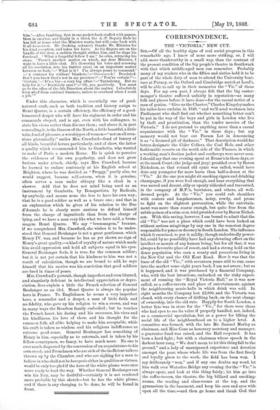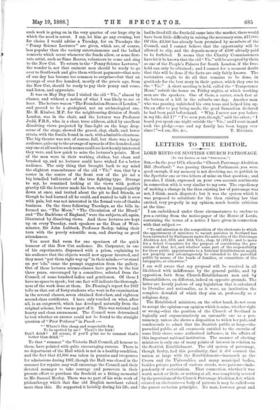CORRESPONDENCE.
THE "VICTORIA," NEW CUT.
Sfit,—Of all the healthy signs of real social progress in this remarkable age, I know of none more striking, or, I will add, more thankworthy in a small way, than the contrast of the present condition of the big people's theatre in Southwark with that which middle-aged men can remember. Probably many of my readers who in the fifties and sixties held it to be part of the whole duty of man to attend the University boat- race at Putney, or the Oxford and Cambridge match at Lord's, will be able to call up in their memories the "Vie." of those days. For my own part, I always felt that the big coster- monger's theatre suffered unfairly in reputation—as many folk and places before it have done—for the casual notice of a man of genius. "Give us the Charter," Charles King,sleymakes his tailor-hero exclaim in 1848, "and we'll send workmen into Parliament who shall find out whether something better can't be put in the way of the boys and girls in London who live by theft and prostitution, than the tender mercies of the Victoria." I do not pretend to anything more than a casual acquaintance with the "Vic." in those days ; but my memory would not bear out Parson Lot in denouncing it as "a licensed pit of darkness." That description would far better. designate the Cider Cellars, the Coal Hole, and other fashionable resorts on the north side of the Thames, in which a working man's fustian jacket and corduroys were never seen. I should say that one evening spent at Evans's in those days, or at the mock Court (the judge and jury) presided over by Baron Nicholson, as that rotund old cynic was called, would have done any youngster far more harm than half-a-dozen at the "Vie," At the one you might sit smoking cigars and drinking champagne, if you were fool enough, and hear everything that was sacred and decent, slily or openly ridiculed and travestied, in the company of M.P.'s, barristers, and others, all well. dressed people. At the "Vie." you could rub shoulders with costers and longshoremen, noisy, rowdy, and prone to fight on the slightest provocation, while the entertain- ment was more than coarse enough, but quite free from the subtle poison of a crim.-con. trial presided over by Baron Nichol- son. With this saving, however, I am bound to admit that the old "Vic." was not a place which could have been looked on without serious misgivings by any one in the remotest degree responsible for peace or decencyin South London. The influence which it exercised, to put it mildly, though undoubtedly power- ful, could by no possibility have had any elevating effect on the intellect or morals of any human being; but for all that, it was always a favourite place of resort, and had a strong hold on the dense population who earn a scanty and precarious living in the New Cut and the Old Kent Road. How it was that the lease of the old "Vic.," with seventeen years still to run, came into the market some eight years back, I am not aware ; but so it happened, and it was purchased by a financial Company, who, with the best intentions, embarked on the risky experi- ment of running the "Royal Victoria Hall," as it was now called, as a coffee-tavern and place of entertainment, against the neighbouring music-halls in which drink was sold. In eight months the Company lost 22,800, and the Victoria was closed, with every chance of drifting back, on the next change of ownership, into the old ruts. Happily for South London, a better fate was in store for the "Vie.," for there were those who had eyes to see its value if properly handled, not, indeed, as a commercial speculation, but as a power for lifting the social life of the neighbourhood on to a higher level. A committee was formed, with the late Mr. Samuel Morley as chairman, and Miss Cons as honorary secretary and manager, a guarantee fund was raised, and the Hall reopened. It has been a hard fight ; but with a chairman whose speech in the darkest hour rang, "We don't mean to let this thing fall to the ground," and a lady of unsurpassed experience and devotion amongst the poor, whose whole life was from the first freely and loyally given to the work, the field has been won. I say deliberately "won," and if any one doubts my word, let him walk over Waterloo Bridge any evening (for the "Vie." is always open), and look at this thing fairly ; let him go into the coffee-tavern, the theatre, the big billiard and smoking- rooms, the reading and class-rooms at the top, and the gymnasium in the basement, and keep his ears and eyes wide open all the time,—and then go home and thank God that such work is going on in the very quarter of our huge city in which the need is sorest. I say, let him go any evening, but for choice I would advise a Tuesday, for on Tuesdays the '" Penny Science Lectures" are given, which are, of course, less popular than the variety entertainments and the ballad concerts which occur whenever the funds allow, or some first-
-rate artist, such as Sims Reeves, volunteers to come and sing to the New Cut. To return to the "Penny Science Lectures," the wonder is, not that eminent men should be ready to go
over to Southwark and give them without payment—that note of our day has become too common to surprise—but that an average of over five hundred, mostly of the gamin age, from the New Cut, should be ready to pay their penny and come, and listen, and appreciate.
It was on May Day that I visited the old "Vic.," almost by chance, and without a notion of what I was likely to see or hear. The lecture was on "The Foundation-Stones of London," and proved to be a geological, not an archwological one. Mr. H. Kimber, M.P. for the neighbouring division of South London, was in the chair, and the lecturer was Professor Judd, F.R.S., who, in a clear, terse address, aided by excellent dissolving views projected by lime-light on the huge drop- scene of the stage, showed the gravel, clay, chalk, and lower strata, with the fossils found in each, with admirable clearness.
The big theatre was not, of course, full, but there was a large audience, quite up to the average of upwards of five hundred, and any one at all used to such scenes could see how keenly interested they were, and how quick to seize the lecturer's points. Most of the men were in their working clothes, but clean and
-brushed up, and no lecturer could have wished for a better audience. The only thing that brought back to my mind
the slightest remembrance of the old "Vie." was, that by a caster in the centre of the front row of the pit sat a big brindled bull-terrier of the true fighting type. Strange to say, he remained looking at the views with perfect gravity till the lecturer made his bow, when he jumped quietly down at once, and trotted about the pit to find friends, as though he had learned all he could, and wanted to talk it over with pals, but was not interested in the formal vote-of-thanks business. On the three following Tuesdays, as the bills in- formed me, "The Moon," "The Circulation of the Blood," and "The Backbone of England," were the subjects, all, again, illustrated by dissolving views. And these lectures are kept
up on every Tuesday, such speakers as the Dean of West- minster, Sir John Lubbock, Professor Seeley, taking their turn with the purely scientific men, and drawing as good attendances.
You must find room for one specimen of the quick -humour of this New Out audience. Dr. Carpenter, in one of his experiments, dispensed with a prism, explaining to
his audience that the objects would now appear inverted, and they must "put them right way up " in their minds,—" or stand on yer 'eds," came the prompt suggestion from the gallery. Out of these lectures science-classes have grown in the last three years, encouraged by a committee, selected from the Council, of some hundred ladies and gentlemen. Of these I have no space to speak ; but one fact will indicate the thorough- ness of the work done at them. Dr. Fleming's report for 1887 tells us that out of forty students who went in for examination in the several classes, seven obtained first-class, and eighteen second-class certificates. I have only touched on what, after all, is an outgrowth, which has developed naturally from the original scheme, but was no part of it. This was rational and hearty and clean amusement. The Council were determined
to test whether an answer could not be found to the straight question of "Poor Potlover" in Punch :— "'Where's this cheap and respectable fun To be spotted by me ? There's the kink !
Don't drink ? All serene, if you'll plut me to summat that's better than drink."
To that " summat " the Victoria Hall Council, all honour to them, have pointed with quite encouraging success. There is no department of the Wall which is not in a healthy condition,
and the fact that £1,800 was taken in pennies and twopences for admissions during 1887, though the Hall was closed in the summer for repairs, may well encourage the Council and their ,devoted manager to take courage and persevere in their present effort to purchase the freehold as a fitting memorial to Mr. Samuel Morley. There was no part of his wide work of philanthropy which that fine old English merchant valued more than this. He supported it lavishly during his life, and
had he lived till the freehold came into the market, there would have been little difficulty in raising the necessary sum, £17,000. Of this, £3,500 has already been promised by members of the Council, and I cannot believe that the opportunity will be allowed to slip, and the deposit-money of 2500 already paid to be forfeited. It seems that the Charity Commissioners have let it be known that the old "Vie." will be accepted by them as one of the People's Palaces for South London, if the free- hold can only be obtained ; and I cannot for a moment doubt that this will be done if the facts are only fairly known. The teetotalers ought to do all that remains to be done, in gratitude for the best story in their quiver, which they owe to the "Vie?' A short meeting is held, called the "Temperance Hour," outside the house on Friday nights, at which working men are the speakers. One of them, a carter, stuck fast at the bottom of a hill in the suburbs one day. Another man who was passing, unhitched his own team and helped him up. On an offer to pay being made, the good Samaritan declared he had been paid beforehand. "Why, I never saw you before in my life, did I ?" "I've seen you, though," said the other; "I heard you speak one night outside the Vic.,' and I went in and took the pledge,—me and my family has been happy ever



































 Previous page
Previous page